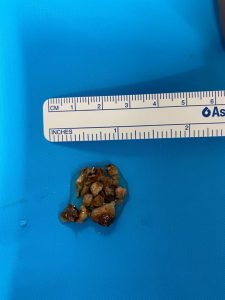Here at Melbourne Urology Centre, our urological specialists, Dr. Shekib Shahbaz and Dr. Tony de Sousa are highly experienced in treating kidney stone disease. They provide a wide range of kidney stone disease treatment options for their patients, ensuring that each individual receives a tailored treatment plan that reflects their unique circumstances. Kidney stones are […]
Here at Melbourne Urology Centre, our urological specialists, Dr. Shekib Shahbaz and Dr. Tony de Sousa are highly experienced in treating kidney stone disease. They provide a wide range of kidney stone disease treatment options for their patients, ensuring that each individual receives a tailored treatment plan that reflects their unique circumstances.
Kidney stones are very common. Around 1 in 10 people will experience kidney stone disease at some point in their lifetime.
Understanding some of the common kidney stone disease treatment options can help you to have informed discussions with your urologist, should you or someone close to you be diagnoses with kidney stones.
Kidney stone disease treatment can vary depending on type and other features.
Kidney stone disease treatment needs to be appropriate for the type of stones that are present. Kidney stones form when minerals and salts in the urine clump together and crystallize, forming little pebble-like structures in the urinary tract.

When planning kidney stone disease treatment and prevention strategies for the future, your urologist will determine what type of stones are present. This can help your urologist to determine what has caused stones to form.
There are four main types of kidney stones:
- Calcium– the majority of kidney stones are calcium stones, in combination with either oxalate or phosphate. Calcium oxalate stones are often related to dietary habits, whereas calcium phosphate stones are usually associated with metabolic conditions or the use of particular medications.
- Struvite– struvite stones form in response to a urinary tract infection
- Uric acid– uric acid stones form when the urine pH is too low (the urine is too acidic). This can happen in people with certain medical conditions that cause chronic fluid loss, those with metabolic conditions, in people who eat very high protein diets, and in diabetics.
- Cystine– cystine stones are rare. They occur in people that have a particular hereditary metabolic condition called cystinuria, which causes their kidneys to excrete too much of a particular amino acid.
Kidney stone disease treatment can vary depending on the location of the stones and the symptoms present.
Kidney stones can form in any part of the urinary tract. In many cases, they do not cause any symptoms until they pass into the ureters, where they often become lodged, causing a blockage. Depending on the position in the ureter a patient can experience severe back/flank pain, pain in the abdomen/groin, and pain when urinating. Sometimes the urine is tinged with blood, and it may smell foul or be cloudy if associated with infection. Nausea and vomiting can also occur, and if there is an infection present, the patient may have a fever or chills.
Your urological surgeon will advise the most appropriate kidney stone disease treatment options for your condition.
During your consultation with your urologist, they will discuss with you all the kidney stone disease treatment options that are appropriate for your individual circumstances. Your urologist will take into account the type of stones you have, the size of the stone, the location of these inside the urinary tract, and whether or not they are causing you symptoms. This is a good time to ask any questions that you may have about the various treatment options.
Kidney stone disease treatment options for small stones and those causing minimal symptoms:
Quite often, smaller stones and those that are not causing symptoms are treated with simple measures such as:
- Ensuring you drink plenty of water. This helps to dilute your urine, increase your urine output and prevent stone size progression or further stones from forming
- Taking pain relief. Useful for the management of mild pain caused by passing small stones
- Medication therapy. Alpha blockers may be prescribed by your doctor to help to relax the muscles in your ureter, which can help you to pass the stone faster and less painfully.
Kidney stone disease treatment options for larger and symptomatic stones:
Some kidney stones are too large to pass through the urine on their own. These stones, or those that are causing pain (renal colic), bleeding, damage to the kidney, or recurrent or ongoing urinary tract infections, will require treatment.
Your urological surgeon may recommend some of the following kidney stones disease treatment options.
Kidney stone disease treatment options – Medication
There are a number of different types of medications that may be prescribed for you as part of your treatment for kidney stones. If you have strong pain, you will be given pain relief medications that are appropriate for your individual health condition. If you have an infection associated with your kidney stones, you will also require antibiotics and prompt management of any obstruction. Other medications may infrequently be prescribed such as:
- Allopurinol for uric acid stones
- Thiazide diuretics or phosphorus solutions in some cases of recurrent multiple calcium stones
- Sodium bicarbonate or sodium citrate to help to lower the pH of your urine in uric acid stones
Kidney stone disease treatment options- Extracorporeal shockwave lithotripsy (ESWL)
This type of kidney stone disease treatment uses sound waves to break up stones within the urinary tract. A special probe is used to precisely direct shockwaves from outside the body, through the body’s tissues, and directly to the kidney stone. The shockwaves break the stone into very small fragments which the patient can then pass through the urine.
ESWL is most often performed under general anaesthesia to allow maximal energy delivery, and typically takes around 30 minutes. It does not require any incisions to be made. Patients usually go home on the same day and can resume their normal activities within 1-2 days.
Kidney stone disease treatment options- Percutaneous nephrolithotomy (PCNL)
PCNL is a surgical kidney stone disease treatment that is performed under general anaesthesia. The surgeon makes a small keyhole incision in the patient’s back into the kidney collecting system. Through this a specialized camera is passed. The kidney stone is located and broken into smaller pieces, which are then removed by the surgeon. This surgical treatment is usually indicated in patients that have complex or extensive stone disease. This treatment is recommended for patients who have stones larger than 1.5cm in diameter.
Most patients will stay 1-2 nights in hospital following this procedure, and complete recovery can take between 2-4 weeks.
Kidney stone disease treatment options – Ureteroscopy and laser
Rigid ureteroscopy is often recommended for stones in the ureter and flexible ureteroscopy for stones smaller than 1.5cm in the kidney. This procedure is performed under general anaesthesia. The surgeon inserts a ureteroscope into the urethra, bladder and then the ureter. The instrument has a camera, which is used to locate the stone. During this procedure a combination of high powered laser and basket extraction is used to extricate the stone disease. Smaller, sand-like fragments remain to be passed through the urine.
This procedure does not require any incisions. Most patients are discharged on the same day, with most patients able to resume their normal activities within around 2-3 days post-treatment.
Melbourne Urology Centre are experts in kidney stone disease treatment.
Fortunately, there are a number of kidney stone disease treatment options available. Our urologists at Melbourne Urology Centre are experts in the treatment and management of kidney stone disease, and are able to offer effective and reliable treatment for all patients. Contact our rooms to make an appointment today.
